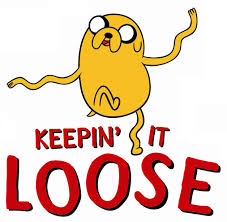loose
英 [luːs]
美 [luːs]
- adj. 宽松的;散漫的;不牢固的;不精确的
- vt. 释放;开船;放枪
- vi. 变松;开火
- adv. 松散地
- n. 放纵;放任;发射
- n. (Loose)人名;(捷、瑞典)洛塞;(英)卢斯;(德)洛泽
使用频率:

记忆方法
将“loose”与“lose”形成对比记忆。想象“loose”衣物松散地挂在衣架上,“lose”则像是衣物被遗落,两者都涉及“失去”的概念,但“loose”特指宽松的状态。
以上内容由AI生成, 仅供参考和借鉴
中文词源
loose 松的
来自lose的形容词,松开的,松的。
英语词源
- loose
-
loose: [13] Loose is one of a large family of words that go back ultimately to Indo-European *lau-, *leu-, *lu-, which denoted ‘undoing’. It includes (via Greek) analyse and paralyse, (via Latin) dissolve and solution, and (via Germanic) lose and the suffix -less. Loose itself was borrowed from Old Norse laus, which was descended from a prehistoric Germanic *lausaz.
=> analyse, dissolve, lose, paralyse, solution - loose (adj.)
- early 13c., "not securely fixed;" c. 1300, "unbound," from Old Norse lauss "loose, free, vacant, dissolute," cognate with Old English leas "devoid of, false, feigned, incorrect," from Proto-Germanic *lausaz (cognates: Danish løs "loose, untied," Swedish lös "loose, movable, detached," Middle Dutch, German los "loose, free," Gothic laus "empty, vain"), from PIE *leu- "to loosen, divide, cut apart" (see lose). Meaning "not clinging, slack" is mid-15c. Meaning "not bundled" is late 15c. Sense of "unchaste, immoral" is recorded from late 15c. Meaning "at liberty, free from obligation" is 1550s. Sense of "rambling, disconnected" is from 1680s. Figurative sense of loose cannon was in use by 1896, probably from celebrated image in a popular story by Hugo:
You can reason with a bull dog, astonish a bull, fascinate a boa, frighten a tiger, soften a lion; no resource with such a monster as a loose cannon. You cannot kill it, it is dead; and at the same time it lives. It lives with a sinister life which comes from the infinite. It is moved by the ship, which is moved by the sea, which is moved by the wind. This exterminator is a plaything. [Victor Hugo, "Ninety Three"]
Loose end in reference to something unfinished, undecided, unguarded is from 1540s; to be at loose ends is from 1807. Phrase on the loose "free, unrestrained" is from 1749 (upon the loose). - loose (v.)
- early 13c, "to set free," from loose (adj.). Meaning "to undo, untie, unfasten" is 14c. Related: Loosed; loosing.
权威例句
- 1. She unbound her hair and let it flow loose in the wind.
- 她把头发解开,让它随风飘动。
- 2. She gathered loose soil and let it filter slowly through her fingers.
- 她捧起疏松的泥土,任其缓缓地从指间漏下。
- 3. She was pretty and young, in a loose smocked sundress.
- 她年轻貌美,一身宽松的刺绣太阳裙。
- 4. A man-eating lion is on the loose somewhere in England.
- 英格兰有一头吃人的狮子跑出来了。
- 5. A gust of wind pried loose a section of sheet-metal roofing.
- 一阵狂风把铺在屋顶上的一块金属片掀起来了。